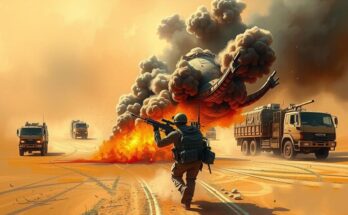Three South African peacekeepers were killed as fighting escalates between the Congolese army and Rwandan-backed M23 rebels in eastern DRC. Despite international calls for a ceasefire, M23 continues its advance toward Goma, leading to increased violence and humanitarian crises in the region. An emergency UN meeting is scheduled to discuss the conflict.
In the eastern region of the Democratic Republic of Congo (DRC), three South African peacekeepers have tragically lost their lives amidst a surge of violence attributed to M23 fighters, reportedly backed by Rwanda. The deadly conflict intensified on Saturday, despite international appeals for the M23 to cease its offensive towards Goma, a key city housing over a million residents. Following unsuccessful peace negotiations led by Angola, the M23’s aggressive maneuvers toward Goma, the North Kivu provincial capital, have exacerbated tensions in the mineral-rich eastern DRC.
An AFP correspondent observed a smoldering UN peacekeeping vehicle on the highway connecting Goma to Sake, the vicinity of fierce clashes. Throughout Goma on Saturday, shops remained open and daily life continued relatively unaffected, notwithstanding the sound of distant artillery fire audible even in the city center. Active hostilities have persisted since Thursday, with combat occurring near the besieged city within a mere ten kilometers.
In response to the ongoing violence, the European Union has urgently called upon the M23 to halt its advances and withdraw its forces. EU foreign policy chief, Kaja Kallas, condemned Rwanda’s military presence in the DRC, categorizing it as a breach of international law, the United Nations charter, and DRC’s territorial integrity. Kallas emphasized the severe humanitarian implications of the M23’s threats against Goma.
President Joao Lourenco of Angola, tasked as a mediator by the African Union, denounced the M23 and its affiliates for their reckless actions that pose a danger to regional stability. Concurrently, the UN has begun evacuating non-essential personnel from Goma to Uganda and Kinshasa. In light of the dangerous circumstances, several countries, including Britain, the United States, and France, have urged their citizens to leave Goma immediately.
The UN Mission in the DRC, known as MONUSCO, reported that its Quick Reaction Forces engaged in significant combat operations in the last 48 hours, employing heavy artillery against M23 positions. Around 15,000 peacekeepers remain deployed in DRC as tensions rise further. The political party Democratic Alliance in South Africa has confirmed the casualties of three peacekeepers, with 18 others injured during direct confrontations with M23 rebels in Sake.
An emergency meeting has been convened by the UN Security Council for Monday to address the escalating crisis. UN Secretary-General Antonio Guterres has expressed alarm regarding the renewed violence, emphasizing that it heightens the risk of a regional conflict. The International Committee of the Red Cross has treated over a hundred individuals injured since Thursday, while the UN reports that approximately 400,000 people have been displaced due to the conflict this year.
Goma remains a focal point of violence, having been the site of unrest for the last three decades. The M23 movement previously occupied this city in late 2012 but was later expelled through a collaborative effort from the Congolese army, MONUSCO, and international diplomatic pressures accounting for Rwanda’s involvement in the conflict. Attempts at negotiation have struggled, with the most recent ceasefire established in July, further strained by accusations from the DRC against Rwanda regarding resource exploitation.
The ongoing conflict in the DRC, particularly in the eastern regions, has its roots in historical grievances and a complex interplay of political and ethnic tensions. The resurgence of the M23, a rebel group claiming to represent the interests of Congolese Tutsis, is allegedly supported by Rwandan military forces, exacerbating the already precarious humanitarian situation. Diplomatic efforts to curb the violence have largely failed, with the recent peace talks yielding no resolutions, leaving civilians vulnerable to ongoing clashes and mass displacement in the region.
In summary, the recent deaths of South African peacekeepers highlight the severity of the conflict in the DRC’s eastern regions, marked by intense fighting between the Congolese army and M23 insurgents. The international community continues to call for a halt to hostilities, while non-essential UN personnel have begun evacuations from Goma due to escalating violence. The region’s protracted instability reflects longstanding tensions and necessitates urgent diplomatic intervention to restore peace and protect civilian lives.
Original Source: www.rfi.fr




